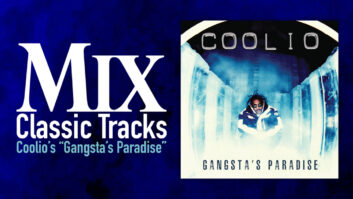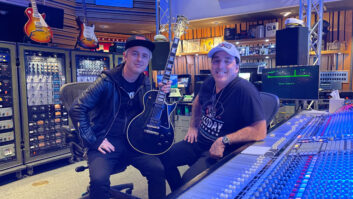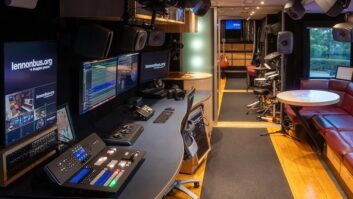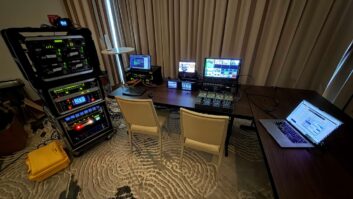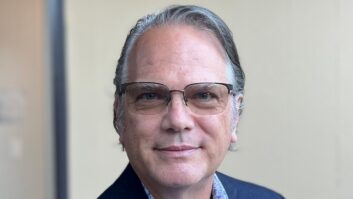Charlotte, NC—Composer Fred Story, founder of Concentrix Music and Sound Design, doesn’t need a weatherman to know which way the wind blows. And so, with the impact of evolving production technologies, changes in the studio business model and the advent of the gig economy, he’s putting his multiroom facility up for sale.
“It’s not like I’m a trendsetter. This is pretty much the model for a lot of guys,” says Story, who plans to convert a room at his house into a studio where he can focus on a lifelong ambition: scoring for motion pictures.
Story started out in broadcasting, taking the plunge and becoming a freelance composer in 1990. He and his wife decided to build a studio in Charlotte, partly so that Becky—a successful actress, radio personality, Emmy Award-winning lyricist and accomplished ceramic artist—could be closer to her aging parents, he says. The other reason was that studios were a rarity in the city at the time. “There would be occasions when I would have trouble getting studio time to meet a deadline. The only way I could have a guarantee that I could meet these deadlines was to have my own studio,” he says.

“I was fortunate in that I got some word-of-mouth referral early on. Before I knew it, I was turning away work. I had to hire an assistant, then another composer. We organically grew into a company.”
Related: Studio Showcase: Virtue and Vice, by Steve Harvey, Pro Sound News, Feb. 28, 2018
Having outgrown the studio, Story and his wife, who handles the business side of things, accepted an offer and sold the facility. “We did fairly well on the real estate deal, so we decided to sink it all back into my dream studio. At that time, 2008, we figured this would be the last studio we’d ever have to own.”
In February 2009, Concentrix moved into its new 4,000 sq. ft. facility, designed by David Rochester of Technical Audio Services and architect Brian Gaddis. The complex houses three identically sized control rooms and three live rooms, ranging from a small iso booth to a large tracking space.
As it turned out, 2008 was a tipping point, not just for the economy, but also for the studio business. “In those days, if there was a session, everyone was in the room,” he recalls. But attended sessions started to become increasingly rare. At the start of 2017, he reviewed the invoices for the previous year: “I realized that for 90 percent of the work for the previous year, I never saw the client’s face.”

Over the past 27 years, Story has been honored with 14 regional Emmy Awards, three Telly Awards and over two dozen Addy Awards. Over the years, Concentrix has also diversified beyond music production, adding voiceover recording, sound design and mix services and evolving into a hybrid recording/post production facility.
“This is a relationship business,” he says. “By having clients in the building who might come in for a simpler task, it was a chance for them to get to know you and—oh, by the way, do you need music for your next gig?”
Buoyed by North Carolina’s film and TV production tax credits, Concentrix’s voiceover booths were busy for a time, he says. “During pilot season, we were doing six or eight ADR sessions a week, hooking up with L.A. stages.”
Related: Studio Showcase: NightBird Recording Studios, by Strother Bullins, Pro Sound News, Jan. 10, 2018
But those tax credits expired, and other states picked up the slack. “There were 17 major Hollywood films shot in Georgia last year,” he reports.

On the music side, “Most of the players that we record, even the great A-list players I use here in Charlotte, have their own home studio setups. Plus, we’re using musicians all over the world. I hired a fiddle player in Vancouver for a documentary not too long ago. You email a chart and tracks, and they send back great stuff.”
The team had grown to include a full-time mixer and sound designer and full-time composer, he continues. But a couple of staff members had to leave for one reason or another. “We organically worked into the freelance model, so we had this big studio with all these rooms and no one sitting in them most of the time. The need for a studio had diminished based on technology and the business model for the industry changing over time.”
Related: Story Scores Mitchell Story, Pro Sound News, March 27, 2012
The facility is on the market, but in the meantime, Story has leased all available space to Elevation Church, which previously had been renting studio time all over the South. “They’re here every day, and I still have my room. Either they’ll buy it, or someone will buy it, and I’ll pack up my stuff.”
David Rochester is already drawing up plans for Story’s home studio. “I’ve got a great big room he says he can make sound fabulous. I’ll keep on doing what I’m doing, except from home.”

Studios aren’t exactly hot real estate properties right now, he acknowledges. “But when we sold the old place, we sank every penny into this place. When the head of the audio department at Elevation came in—he’s been a studio owner; they recruited him in Nashville—he was asking questions about the infrastructure and the wiring. He says it all the time: ‘You guys built this place right.’ The clients who do come here just rave about the studio. I know there’s someone for whom the studio would be a good fit.”
Exhibiting at the NAB Show? Enter the NewBay Best of Show Awards! EXTENDED DEADLINE: MARCH 30!
As Story also observes, running a studio takes time. He’s looking forward to his newfound freedom after years of having to be around to answer the phones and accept deliveries.
“I started thinking, if I had all that time back—just the time it takes to run and manage a facility—what if I could put that into just being a composer, the thing I started out to do? I haven’t been able to get out to film festivals and industry events. This will free me up and allow me to do the relationship building to get those scoring gigs,” he says.
“I said to my wife, Do I really want to check out without giving it a shot? I know it’s competitive, but nothing ventured, nothing gained. So here I am, back where I started.”
Concentrix • concentrixmusic.com
